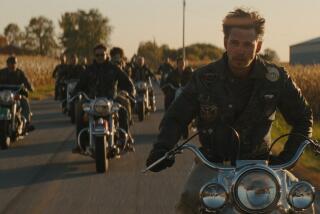MOVIE REVIEW : Train Robber ‘Buster’ a Family Man at Heart
- Share via
“Buster” (citywide) is really two movies. The first is a somewhat antic re-creation of the 1963 Glasgow-London mail train heist; this part is a little bloodless and hectic. It skitters along with more nervousness than tension, and it pales beside most other heist movies, from “The Asphalt Jungle” right up to this year’s “Bellman and True.”
The second half is a slightly dotty but endearing true-life love story about two fish out of water: a scapegrace bank robber on the run in Acapulco and his loyal but unadaptable wife, who prefers steak and chips to tortillas and can’t stand the heat, the hospitals, the hedonism.
It’s here that the film’s social perspective slips most clearly into focus. Buster Edwards (played by rock singer-composer Phil Collins) is an ebullient little sociopath. He’s a slimy-slick little lower-class con man who envies the toffs and is always ablaze with get-rich-quick schemes. His wife, June (Julie Walters), is a long-suffering, loyal, tough helpmate, who always has to sweep up the pieces.
The members of the mail train gang aren’t portrayed as violent deviants either. They’re a faceless mob in suit and tie, perhaps all bewitched by the myths of social mobility. In this case, Buster and his buddy, Frank Reynolds (Larry Lamb), the gang leader, realize the wildest dream of all of them. Those two win the pool, relieve the train of more than 2.6 million, even while most of their unlucky comrades rot in jail: victims of a pre-election law-and-order campaign by the scandal-rocked Tory government.
Yet, in true nouveau riche fashion, the lucky proles squander the jackpot, losing much of the share of the swag to swindlers and money-changers. It’s here that the movie hits its core theme. Buster’s buddy Frank revels in Acapulco. He and wife Franny are arrivistes with a vengeance, luxuriating in the fancy menus and beaches.
But Buster, whom we first see bashing in a shop window and stealing a clothes dummy to get himself a suit for a friend’s funeral, is, for all his bluff and con, basically a family man. He’s in love with a woman whose values are set and sturdy, who prefers a substantial climate--rain, fog, snow and misery--to Acapulco. That’s the richer story--and because what happens to Mr. and Mrs. Buster Edwards is basically true, it adds sauce to the irony.
“Buster” remains essentially divided. The first half doesn’t lead inevitably into the second; doesn’t plant enough of the right seeds--either of the Buster-June or Buster-Frank relationships. Writer Colin Shindler and director David Green are after all the dry little details that would make this daft love-and-money story ring true. And they get a lot of them: the period rock ‘n’ roll, the costumes, the streets, a slice of “Rawhide” on TV, all the ambiance of the early James Bond-Beatles era.
But in a way, they’re too dry, too real--and maybe too superficial. They downplay the robbery too much, and they don’t compensate with enough enlivening humor. “Buster” is a movie that needs a lot more edge in its first half, in order to let the sweetness and surprise of the second flow out more easily. Except in the performance of Julie Walters as June, and some of the time, Sheila Hancock as her mother and Collins as Buster, it doesn’t really get it.
Walters is the best reason for seeing the movie. Her emotions are real as rain and flowers and hot sausage, true as steel. She incarnates an essential resilience and purity in some lower-class urban marriages.
Surrounded by the muck of the city, the lunacy and danger of Buster’s dreams, Walters’ June clings to those few things she can count on, while her loving, destructive scamp of a husband dances all around her. There’s something both funny and inspiring in that resolve: reason enough to see “Buster.”
‘BUSTER’
A Hemdale Releasing Corp. presentation of an NFH production. Producer Norma Heyman. Director David Green. Script Colin Shindler. Executive producers John Daly, Derek Gibson. Camera Tony Imi. Production design Simon Holland. Music Anne Dudley. Editor Lesley Walker. With Phil Collins, Julie Walters, Larry Lamb, Stephanie Lawrence, Sheila Hancock.
Running time: 1 hour, 33 minutes.
MPAA rating: R (under 17 requires an accompanying parent or adult guardian).
More to Read
Only good movies
Get the Indie Focus newsletter, Mark Olsen's weekly guide to the world of cinema.
You may occasionally receive promotional content from the Los Angeles Times.









